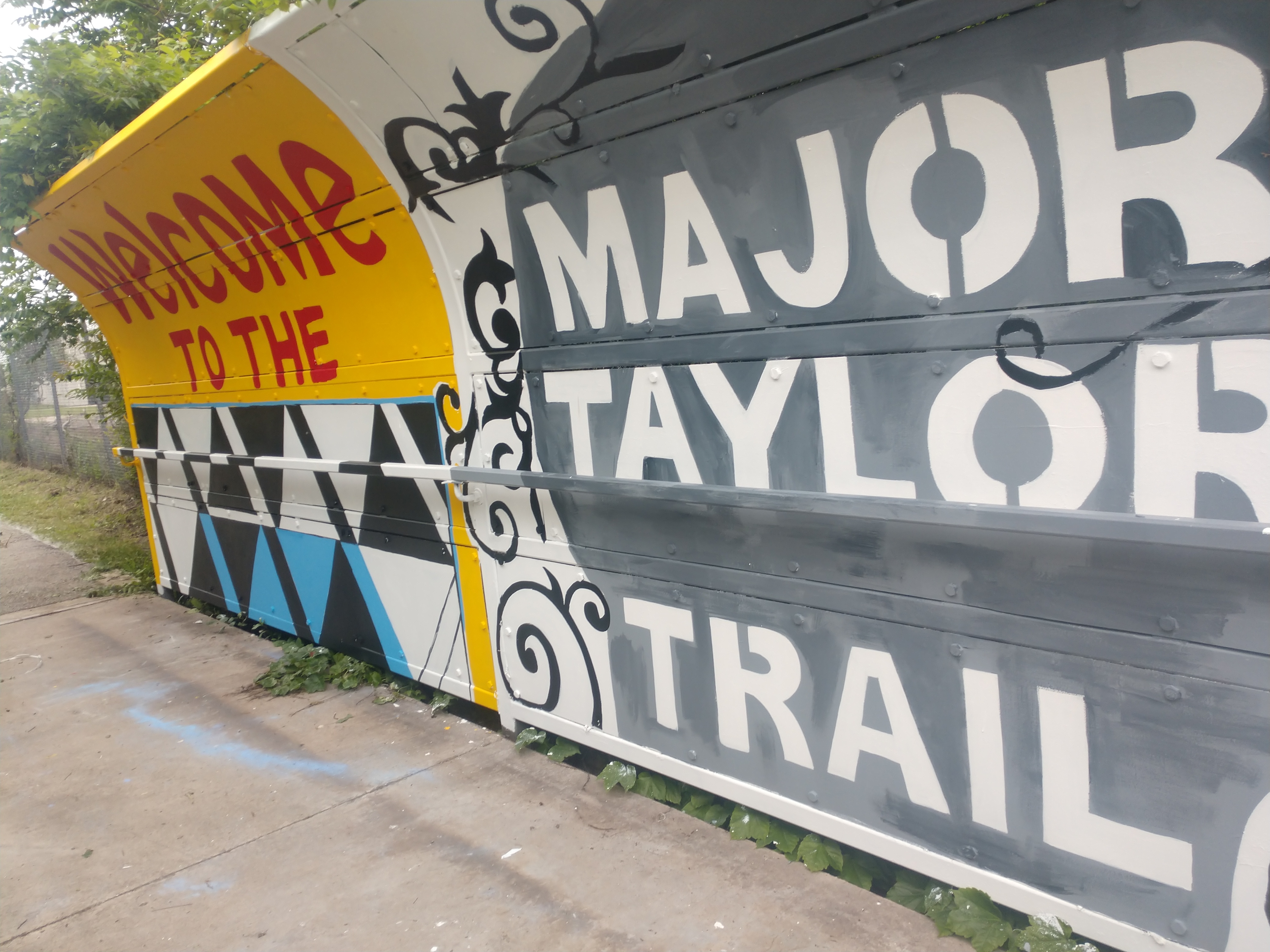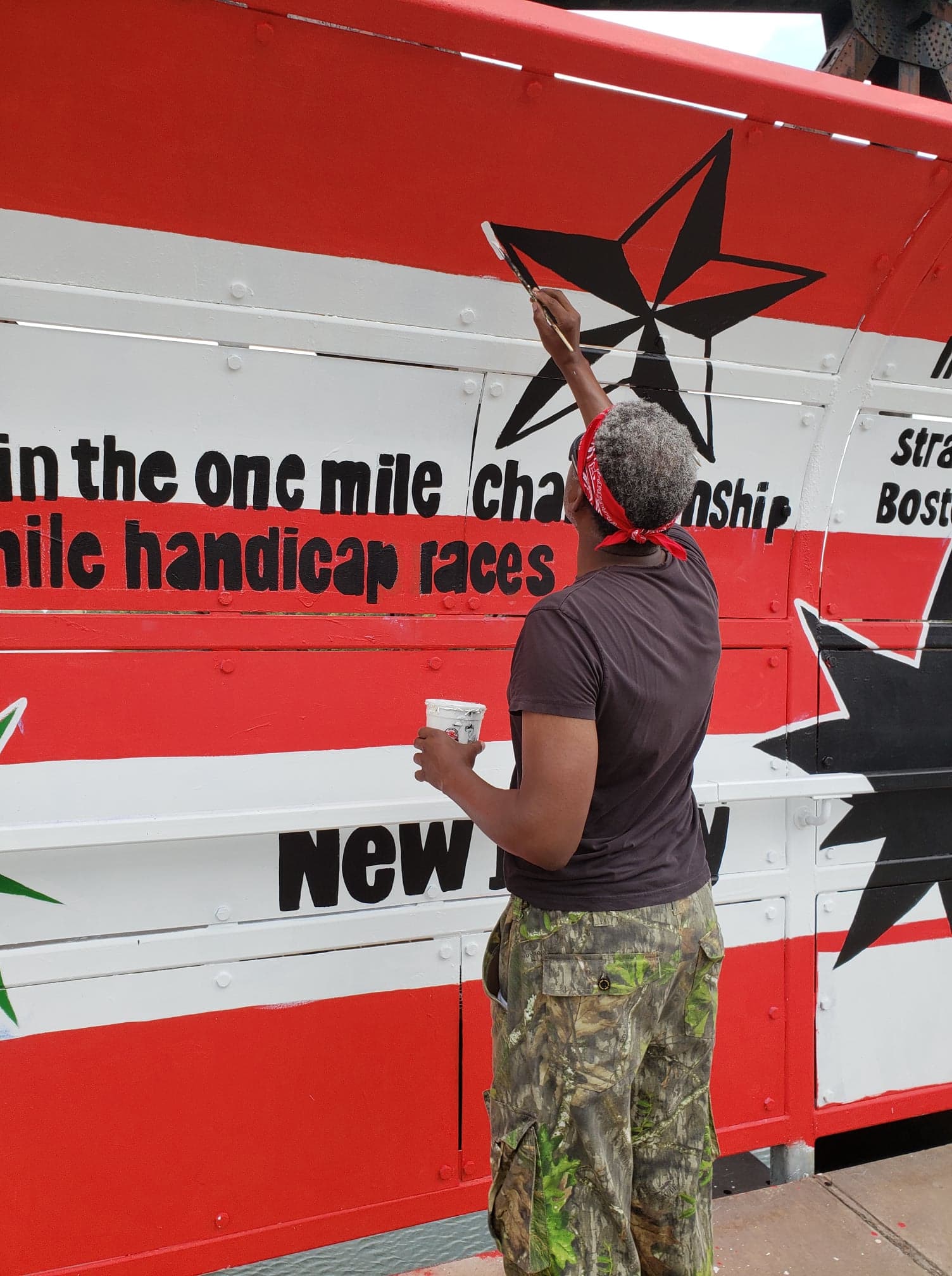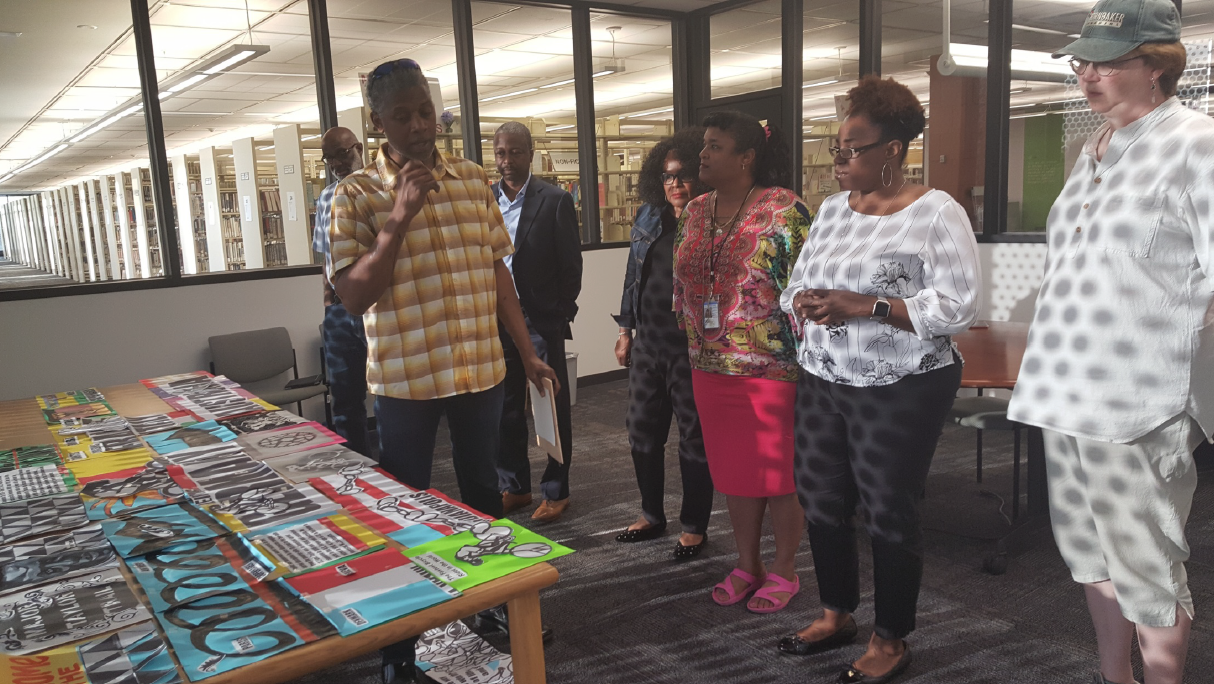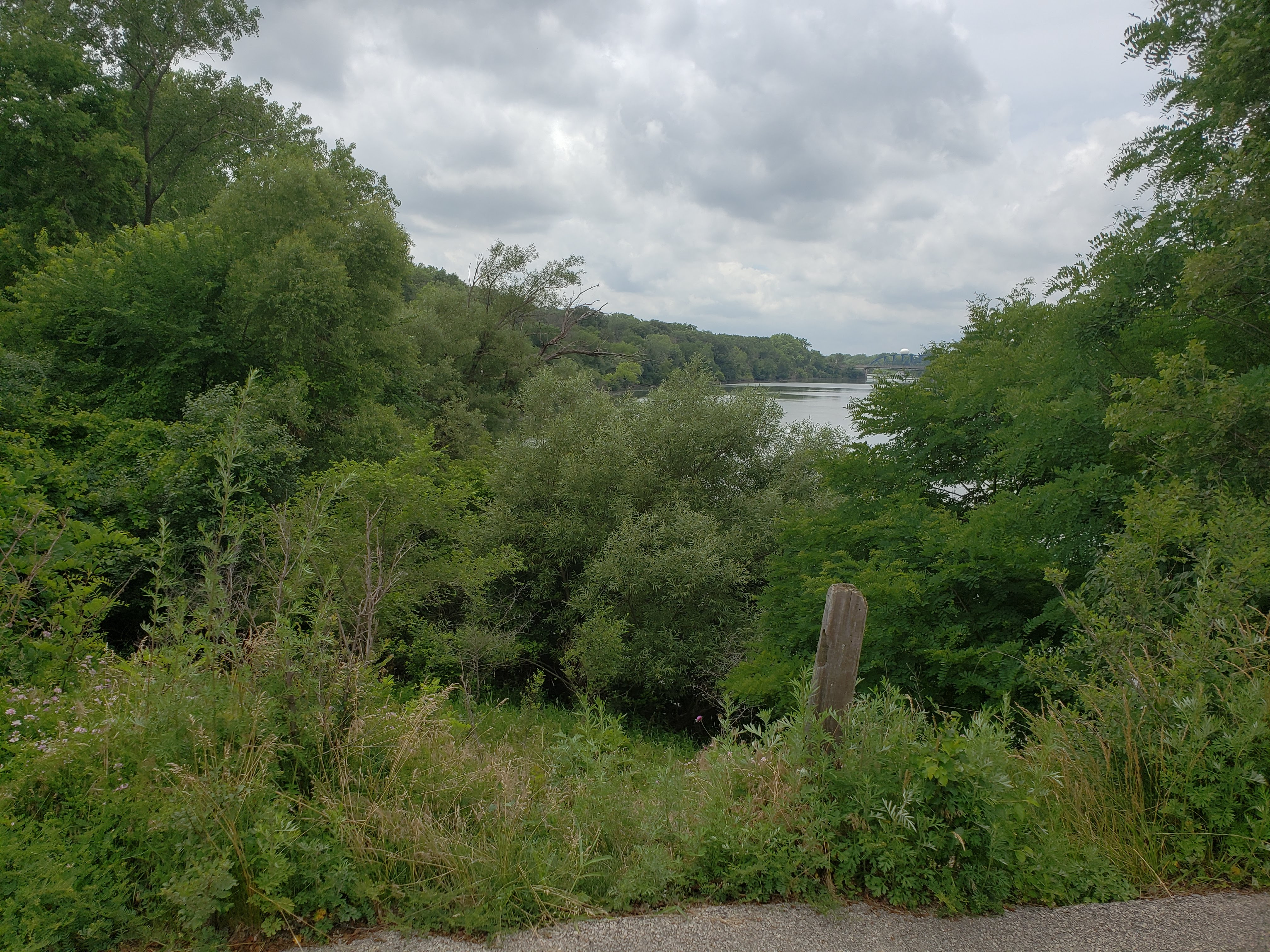A new 400-foot-long mural commemorates the first African-American world champion cyclist

Brenda Dixon
A new mural is being painted on the Major Taylor Trail
The Chicago Community Trust is currently funding ten community-led riverfront projects through their Our Great Rivers grant. This piece is the third of a ten-part series highlighting these projects.
A brand new mural is being painted over the Little Calumet River literally as we type this sentence. Located along the Major Taylor Trail in West Pullman, the mural will celebrate the life of the eponymous Marshall “Major” Taylor—the legendary African-American gold-medal bike racer and 20th Century civil rights champion—as well as the surrounding communities.

CNIP
The Major Taylor Trail spans 7.5 miles across south Chicago, from Dan Ryan Woods on 83rd & Western to Whistler Woods in Riverdale, IL, where it connects to the newest section of the Cal-Sag Trail. Yet, since opening ten years ago, it has struggled with low ridership.
Luckily, a dynamic coalition of local community advocacy groups is teaming up to increase community use of the MTT and bring various environmental and aesthetic improvements to the trail.
The Major Taylor Trail is a paved, 7.5-mile-long bike path on Chicago's southwest side, flanked on each end by picturesque forest preserves. But since the trail opened about a decade ago, it's struggled with low ridership.
Dr. Brenda M. Dixon, the former events manager for the Major Taylor Cycling Club Chicago (MTC3) applied for the Chicago Community Trust’s Our Great Rivers grant last year on behalf of the MTC3. “We found out about the grant a bit late, so we ended up completing the entire application within a span of three weeks,” said Dr. Dixon.
Upon being awarded the grant, MTC3 teamed up with Women RUN the World (WRTW), a local health advocacy organization that empowers women through fitness, who became the lead implementation organization for the grant. In addition to these groups, the coalition working to implement this project includes: the Friends of the Major Taylor Trail (FOMTT), Terra Engineering, the Community & Neighborhood Improvement Project (CNIP), Archi-Treasures. The group is working closesly with the Forest Preserves of Coook County and the Chicago Park District.
A fierce advocate for the trail and surrounding community, Dr. Dixon and the FOMTT have always advocated for improvements along the trail, whether from cleaning up broken glass to championing larger projects, like the new mural on a long-vandalized wall.

MPC
Bernard Williams painting the Major Taylor Trail mural.
“One day as we were riding down the trail, we were looking at that huge wall on the bridge over the Little Calumet River, and we thought, ‘Wouldn’t it be nice to have a mural there?,’” said Dr. Dixon, referring to the large wall on the railroad and pedestrian bridge that crosses over the Little Calumet River near 129th Street.
A dynamic coalition of local community advocacy groups is working to raise the profile of this underutilized asset—through art. With funding from The Chicago Community Trust through the Our Great Rivers grant, Bernard Williams is painting a Major Taylor mural that will stretch over 400 feet.
With the help of Archi-Treasures, an arts-focused community development nonprofit, the MTT will now be home to a mural dedicated to Major Taylor. According to Dr. Dixon, this will be the largest mural in the country dedicated to Major Taylor.
The coalition of organizations working of the grant ensured that the surrounding communities had a voice in the creation of the mural. After putting out a request for proposal for an artist, an advisory committee consisting of local community stakeholders was formed to choose an artist, who eventually decided on Chicago-based artist and muralist Bernard Williams.

CNIP
The advisory committee discusses mural design with artist Bernard Williams.
In addition to the new mural, other capital improvements are happening all along the MTT. Anne Alt, the Secretary for the Friends of the Major Taylor Trail, also shares Dr. Dixon’s vision for a more accessible MTT. Just beyond the 129th Street bridge is Whistler Woods, a Forest Preserves of Cook County site, whose extensive riverbank is generally inaccessible and prevents trail users from accessing the river. Alt recalled how riverfront access has been a longtime dream of frequent trail users:
“We led a birdwatching ride through Whistler Woods one day and we kept thinking ‘wish we could go down to the river,’” said Alt.
Now, the coalition is working with Terra Engineering and the Forest Preserves of Cook County to develop design concepts for an area where trail users can stop to relax and enjoy the view of the river. The group is hopeful that these plans will provide a concrete step forward in improving access along the river.

MPC
The south end of the bridge over the Little Calumet River. Imagine an overlook here and clearing to see the river.
In addition to these aesthetic improvements, CNIP, a community development and empowerment organization led by Dr. Dixon, will be hosting a ribbon-cutting and 5k run/walk on Saturday, July 21 at Whistler Woods in Riverdale. The event will unveil the new mural and celebrate the 10th Anniversary of the Major Taylor Trail and the Cycling Club, as well as the 5th Anniversary of Women Run the World. Karen Donovan, Major Taylor’s great-granddaughter, will also attend the event.
“Women RUN the World usually has their annual 5k run along the lakefront, and the MTC3 has their annual Victory Ride cycling event on the MTT. But since we teamed up on the grant together, we decided to move the 5k to the Major Taylor Trail so that we could celebrate their 5th anniversary together with the Trail’s and Cycling Club’s 10th anniversaries,” said Dr. Dixon. The Victory Ride will still be held on July 21, but will be held as an independent event at the MTT.
Such extensive coordination at this event shows the bright future for the MTT and its advocacy organizations. MTC3 President Kevin Carter noticed that the key to such collaboration is to respect every partner involved in the project.
“You have to find common ground between every group,” said Carter. For the future of the project and MTT, he hopes to have expanded educational and visual opportunities along the trail.
Alt agrees with Carter’s vision for the future of the MTT, and believes that more of the community will use the MTT.
“The Major Taylor will be a great destination for the South Side, and for other people outside the neighborhood,” said Alt.
Change comes one improvement at a time, and transforming the MTT into a more well-known trail will depend on the small but vital steps forward that these community groups have made thus far in the grant, as well as through good working relationships with surrounding communities.
“We have to continue improving signage along the trail and into Whistler Woods, as well as building relationships with the surrounding neighborhoods. That’s what’s important.”
------------------------------------------------------------------
Come out to paint the Major Taylor Trail on June 29 and 30, from Noon-3pm. Details here.
Register for the July 21 ribbon cutting and 5k run/walk here.
------------------------------------------------------
Nicolas Robledo is a former research assistant at Metropolitan Planning Council and a current student at University of Illinois at Chicago.